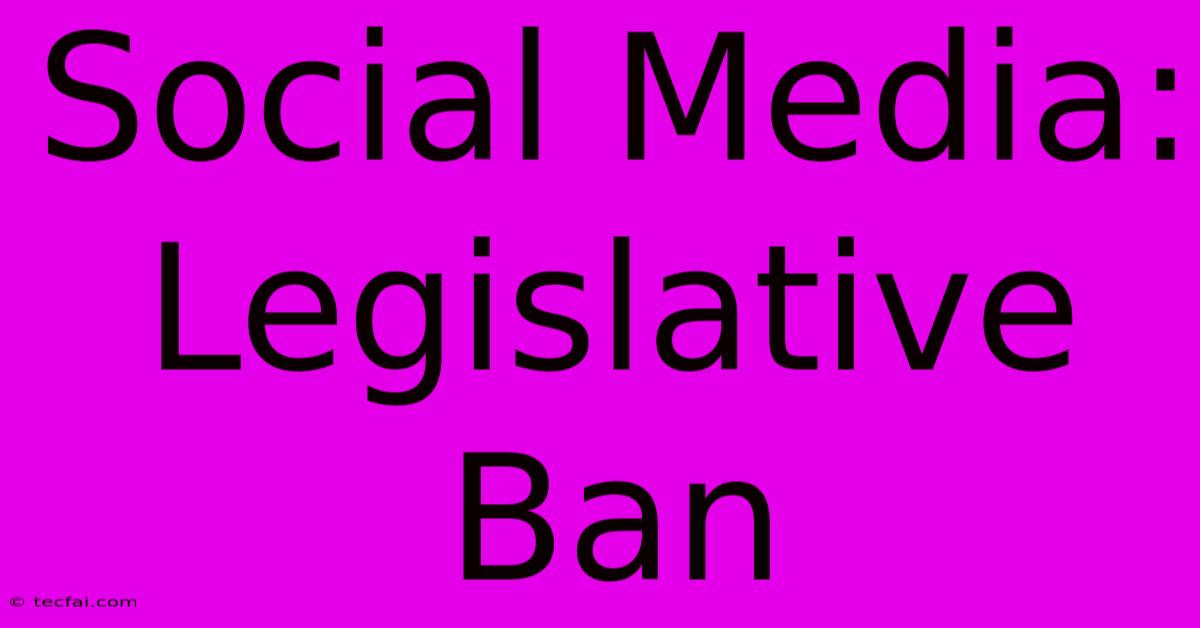Social Media: Legislative Ban

Discover more detailed and exciting information on our website. Click the link below to start your adventure: Visit Best Website tecfai.com. Don't miss out!
Table of Contents
Social Media: The Growing Movement for Legislative Bans
The pervasive influence of social media on our daily lives has sparked intense debate, leading to a growing movement advocating for legislative bans or significant restrictions on certain platforms. This isn't about simply limiting personal use; the discussion centers around concerns about misinformation, mental health impacts, data privacy violations, and the potential for these platforms to be manipulated for political purposes. This article explores the arguments for and against legislative bans on social media, examining the complexities and potential consequences of such a drastic measure.
The Case for Bans: Addressing Serious Concerns
Proponents of legislative bans point to a multitude of compelling reasons. These include:
-
Combating Misinformation and Disinformation: The rapid spread of false or misleading information on social media poses a significant threat to democratic processes and public health. Legislative action could mandate stricter content moderation policies, potentially mitigating the spread of harmful narratives. This is particularly crucial during elections and public health crises.
-
Protecting Mental Health: Mounting evidence suggests a correlation between heavy social media use and negative mental health outcomes, particularly among young people. A ban, or at least significant restrictions, could potentially mitigate these effects by limiting exposure to potentially harmful content and promoting healthier online habits.
-
Addressing Data Privacy Violations: Social media companies collect vast amounts of user data, raising concerns about privacy and potential misuse of personal information. Legislative bans could offer a pathway to greater data protection and control over personal information.
-
Curbing the Influence of Foreign Interference: Social media platforms have been exploited for foreign interference in elections and to spread propaganda. Bans could limit the ability of foreign actors to manipulate public opinion and undermine democratic processes.
The Counterarguments: Freedom of Speech and Unintended Consequences
Opponents of legislative bans raise significant counterarguments, primarily centered around:
-
Freedom of Speech: Bans on social media platforms represent a significant restriction on freedom of expression, a fundamental right in many democratic societies. Such restrictions raise complex legal and ethical questions.
-
Economic Impact: The social media industry employs millions of people worldwide. A complete ban would lead to significant job losses and economic disruption.
-
Difficulty of Enforcement: Effectively enforcing a ban on social media would be incredibly challenging, given the global reach of these platforms and the potential for circumvention through VPNs and other technologies.
-
Lack of Alternative Solutions: Before considering a ban, alternative solutions to address the problems associated with social media must be explored, such as improved content moderation policies, media literacy education, and stronger data protection regulations.
Finding a Middle Ground: Regulation, Not Elimination
The debate over social media bans reveals a need for a nuanced approach. A complete ban is likely impractical and raises serious concerns about freedom of speech and economic impact. However, the problems associated with social media are too significant to ignore. The solution may lie in targeted regulation, focusing on:
-
Strengthening Content Moderation Policies: Platforms should be held accountable for the content they host, with stricter penalties for failing to remove harmful material.
-
Improving Data Privacy Protections: Robust data privacy regulations are essential to protect users' personal information from misuse.
-
Promoting Media Literacy: Educating users about how to critically evaluate information online is crucial in combating misinformation.
-
Increased Transparency and Accountability: Social media companies need to be more transparent about their algorithms and how they moderate content.
The debate surrounding social media bans is far from over. It requires careful consideration of competing values, potential consequences, and the exploration of alternative solutions. A balanced approach that emphasizes regulation rather than outright bans may be the most effective path forward. The focus should be on protecting users while preserving freedom of expression and fostering a healthy online environment.

Thank you for visiting our website wich cover about Social Media: Legislative Ban. We hope the information provided has been useful to you. Feel free to contact us if you have any questions or need further assistance. See you next time and dont miss to bookmark.
Featured Posts
-
2025 Sick New World Cancelled
Nov 30, 2024
-
Election 2024 Taoiseachs Tik Tok Presence
Nov 30, 2024
-
Sephoras Sale 50 Bestsellers
Nov 30, 2024
-
Bi And Big Data For Business
Nov 30, 2024
-
Steinfeld And Allen Engaged Romance Hints
Nov 30, 2024
